Choosing an eCommerce platform for your apparel brand can seem like a daunting choice. Online sales make up a significant portion of the apparel business today, and one wants to ensure that their chosen online sales platform meets the unique needs of their business. We’ve listed ten of the most popular e-commerce platforms to help you make an informed choice.
Before we dive in, let’s talk about the technical features offered by these platforms. Some features are more aesthetic, such as the customization options for your storefront. Other features, such as search-engine optimization (SEO), help drive traffic to your site by harnessing the power of search algorithms and are business-critical for those selling online. Social media integration, blogging features, content management, and email integration allow you to harness the power of social media to promote your brand and allow customers to share their finds with like-minded friends. Other important features to consider include hosting, domain services, security, technical support, payment options, data analytics and recovery, and scalability. Let’s see how these sites stack up.
1. Magento
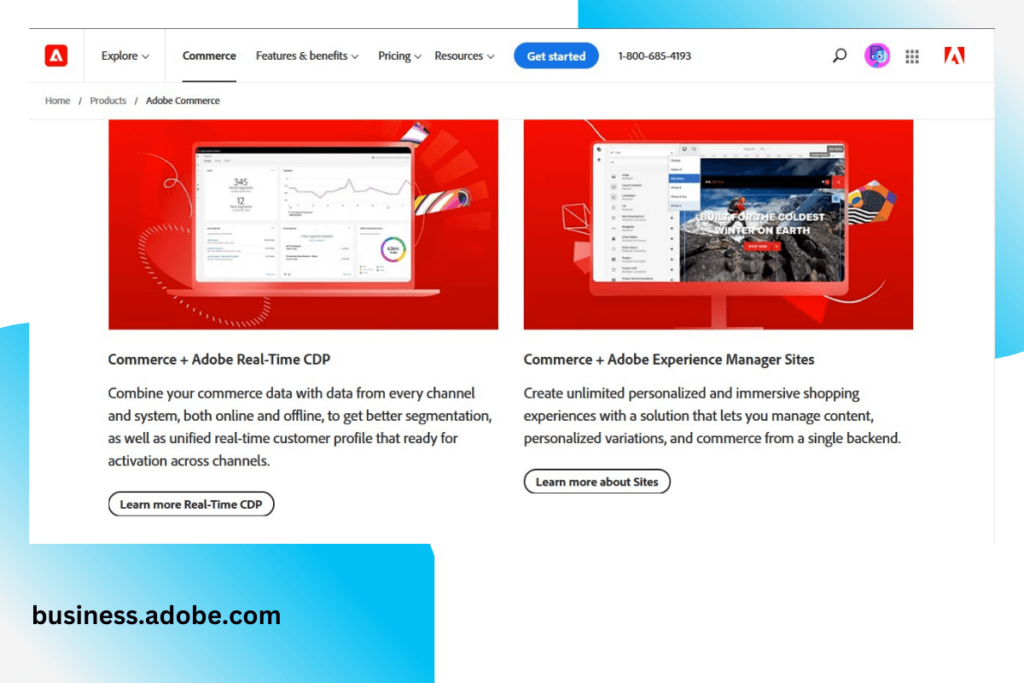
Owned by tech giant Adobe, Magento is one of the most popular eCommerce platforms for apparel sellers. Boasting more than 190,000 active users, the Magento platform boasts a highly customizable page builder, easy social media integration, Amazon integration, and SEO features. Magento has integrated business intelligence software and analytics, allowing sellers to parse customer data; these pair nicely with Magento’s user segmentation and targeting tools. Finally, Magento has a marketplace offering an assortment of site add-ons to help sellers.
While Magento has a lot to offer, the price tag – $22,000 and up for the enterprise version – may turn off some aspiring sellers. While there is an open-source version of Magento available, it will require some technical expertise in languages such as PHP and Java. With that in mind, Magento may be best for companies that are experiencing rapid growth or companies that can afford to hire technical assistance. Fashion brands such as Hermes rely on Magento for their eCommerce needs.
2. WooCommerce
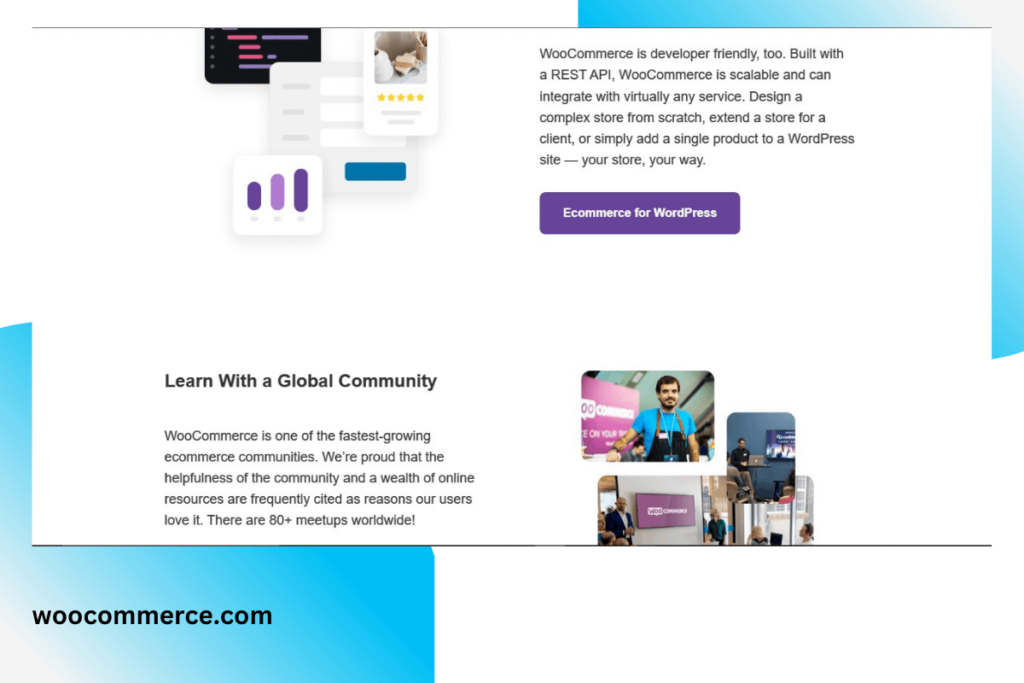
WooCommerce is an eCommerce platform offered by the ever popular content-management service WordPress. WooCommerce offers users easy integration into WordPress web-content management, including highly customizable options for your storefront, inventory management and advanced ordering tools, SEO plug-ins, and a multitude of available plugins for a variety of business purposes. While the wisdom of the crowd is not always right, WooCommerce currently has about 3.8 million active websites on their platform.
Because of their relationship with WordPress, WooCommerce is not compatible with hosting on other platforms such as Wix or SquareSpace. Users may also find some familiarity with PHP and HTML to be helpful, although they are not strictly necessary. And WooCommerce only offers customer support through a ticketing system. All things considered, WooCommerce is a strong contender for businesses seeking an e-commerce platform. Elizabeth Rose Boutique is a WooCommerce client; see their site here.
3. Shopify
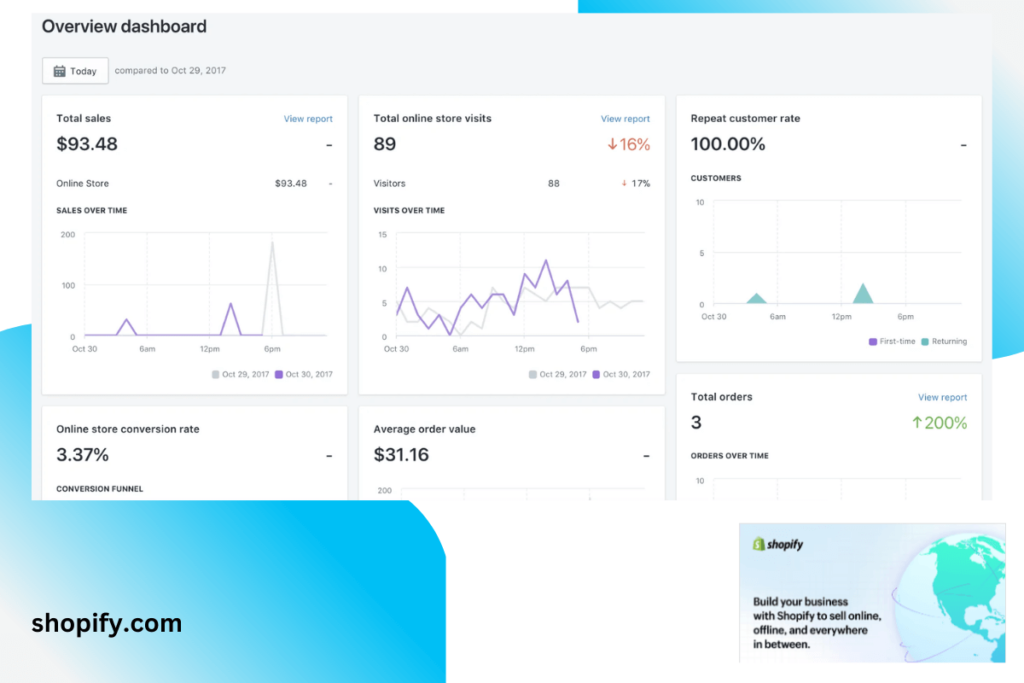
Used by brands such as Sephora, Gym Shark, and MVMT, Shopify offers apparel sellers a comprehensive solution for an e-commerce storefront. Point-of-sale integration allows apparel sellers to maintain both an online presence and a traditional storefront with one sales system. Shopify has also optimized their platform to provide fast load speeds for storefronts, which helps sellers reduce bounce rates. Shopify’s customer service is available through the phone, online chat, or an email system.
Shopify’s e-commerce platform is built to allow the user to integrate their storefront easily into social media posts. MailChimp integration provides another way of reaching your customers. In addition to all of this, Shopify boasts an easy-to-use interface and an exceptional content management platform.
Shopify does allow users to pick from a variety of base themes, but many end up looking very similar. You can customize your site beyond the base themes, but to fully customize you must learn basic coding skills with Shopify’s language, called Liquid.
4. BigCommerce
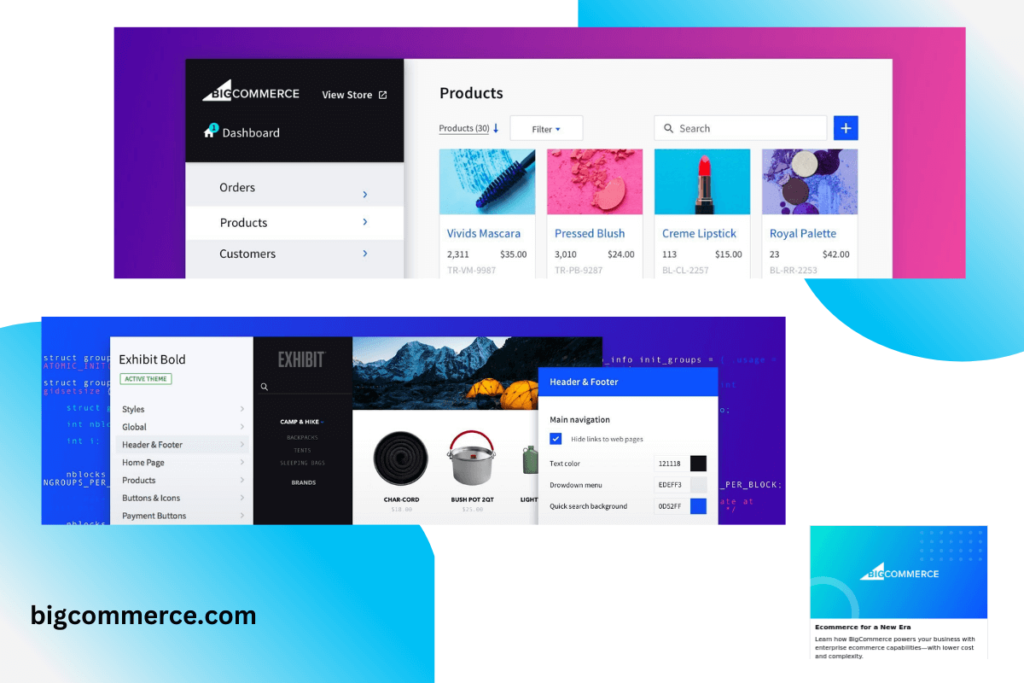
BigCommerce is a relative newcomer to the e-commerce scene, but despite their small size they are rapidly growing. Their customer portfolio includes such well-known apparel brands as American Apparel, Natori, and Verge Girl.
One of the key features that sets BigCommerce apart is their emphasis on detailed reporting. If you like data, you will probably like the detailed data about conversion rates and sales channel reporting that you can generate from BigCommerce. With their focus on in-depth data analytics, a 24/7 chat feature, and an easy-to-use integrated tutorial system, BigCommerce is a platform suitable for apparel designers of all types.
That said, BigCommerce’s pricing scheme is listed in scalable tiers and varies tier to tier, making it potentially more expensive than fee-based e-commerce platforms. There is a wide selection of website themes to choose from which allows you to find a look best for your brand.
5. OpenCart
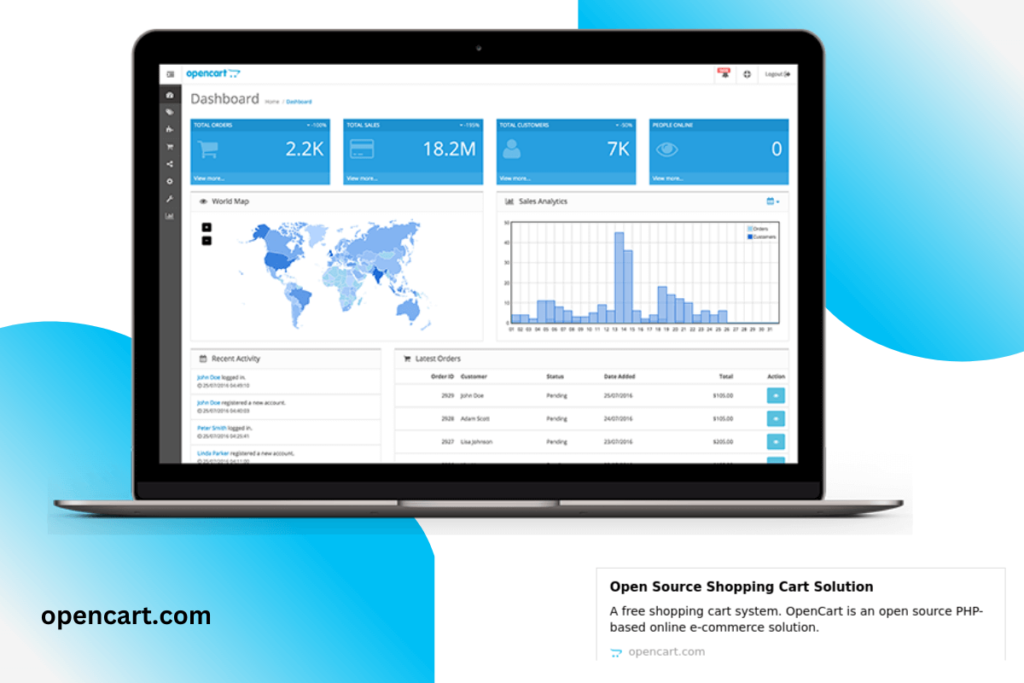
Open-source, scalable to your business, and highly customizable, OpenCart offers brands the ability to create storefront themes specific to their apparel – a lovely way to attract the attention of the selective internet shopper. There is a simple and user-friendly dashboard from which you can take control of your e-commerce platform. OpenCart offers customers high-end storefront management technology, such as buil-in SEO features; product, order, and customer management; tax rules; and the ability to manage coupons and coupon codes. If you can’t find what you need in the base package, The OpenCart Marketplace offers users a deep library of more than 13,000 modules, themes, and add-ons.
OpenCart has also built their platform to integrate easily with payment gateways such as PayPal, Amazon, Authorize, and SagePay. Shipping is also integrated into OpenCart with easy access to shippers such as UPS, FedEx, USPS, Royal Mail, and Australia Post.
While it is open-source and inexpensive, OpenCart does not have an integrated web host: you will need to find a host for your platform. Add-ons, extensions, and modules can add up over time, but tend to be single-payment rather than requiring monthly user fees. The customizability of OpenCart can make it a bit technical to use; users who are not particularly tech-savvy may need to find a web developer to assist them.
6. Big Cartel
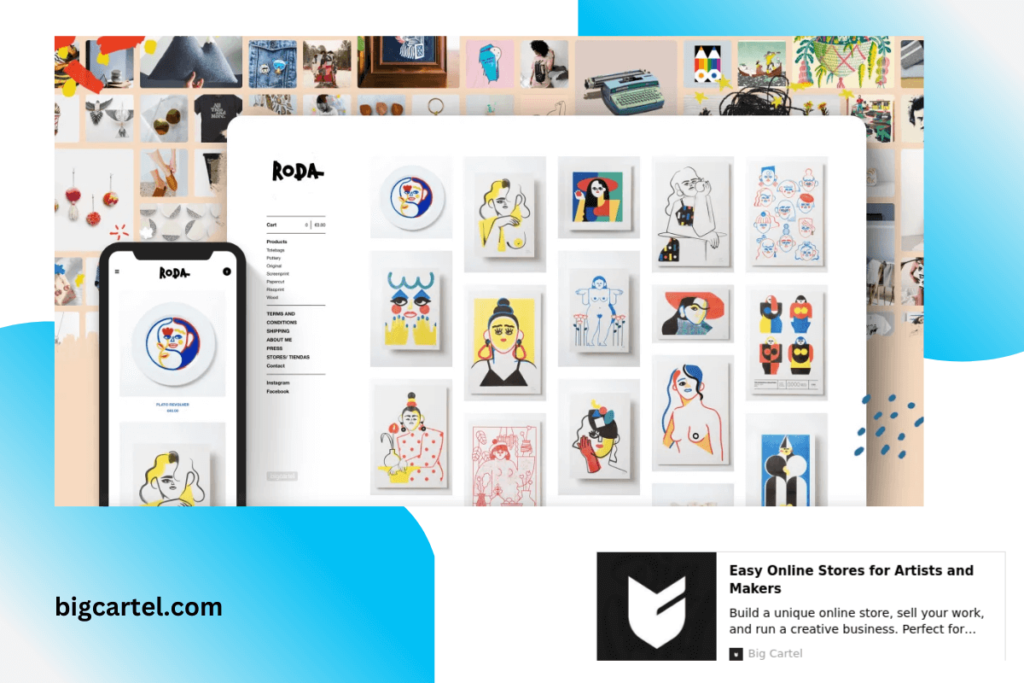
A popular choice among apparel brands just getting started or beginning to grow is Big Cartel. Designed with artists of all kinds in mind, Big Cartel caters to small-to-medium sized makers. Big Cartel offers easy-to-configure custom themes. Big Cartel’s pricing scheme is designed to be affordable; users can list 500 products for only about $30 a month, which includes product images, inventory management, Google analytics, promotions management, shipment tracking, and a sales tax assistant.
Big Cartel is an inexpensive option for a comprehensive e-commerce storefront, but they lack some advanced features like SEO that would be useful to the apparel entrepreneur. Big Cartel is also not scalable, meaning that companies experiencing rapid growth or expansion may outgrow the platform. However, for entrepreneurs or small business owners who are ready to move up from a platform such as Etsy, Big Cartel is an excellent choice.
7. Shift4Shop (3dcart)
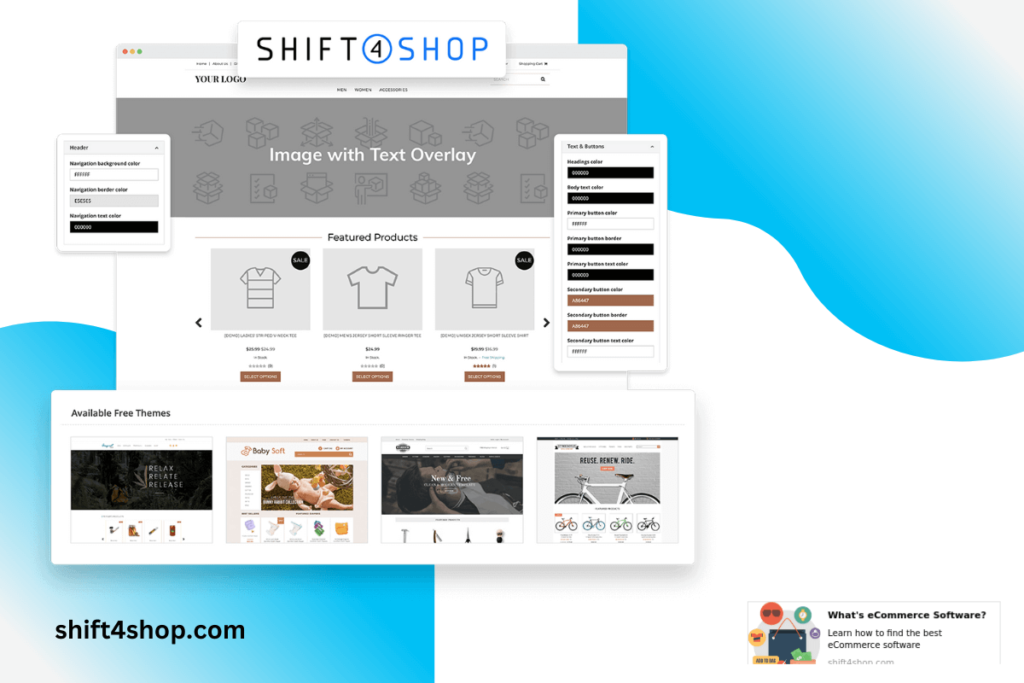
For apparel designers seeking a drop-ship model Shift4Shop (also known as 3dcart) offers a specialized platform. Shift4Shop allows users to open their drop-ship shop for only $9.99 a month, with an option for small businesses to then shift to a Startup platform if their trailing 12-month sales number exceeds $10,000. Shift 4 Shop offers customers ground-up storefront builds, free domain registrations, a custom shopping cart, secure hosting, and access to 24/7 customer support teams and a shared SSL certificate for their site. There is no restriction or cap on customer orders, and there is no bandwidth cap for storefronts.
Shift4Shop connects apparel designers with a variety of drop-shipping product specialists, which allows brands to expand their variety of products in a lot of useful ways. Shipping integration allows users to know shipping costs up-front, minimizing cart abandonment. Similarly, sellers can use a variety of payment gateways such as PayPal and Square.
8. Volusion
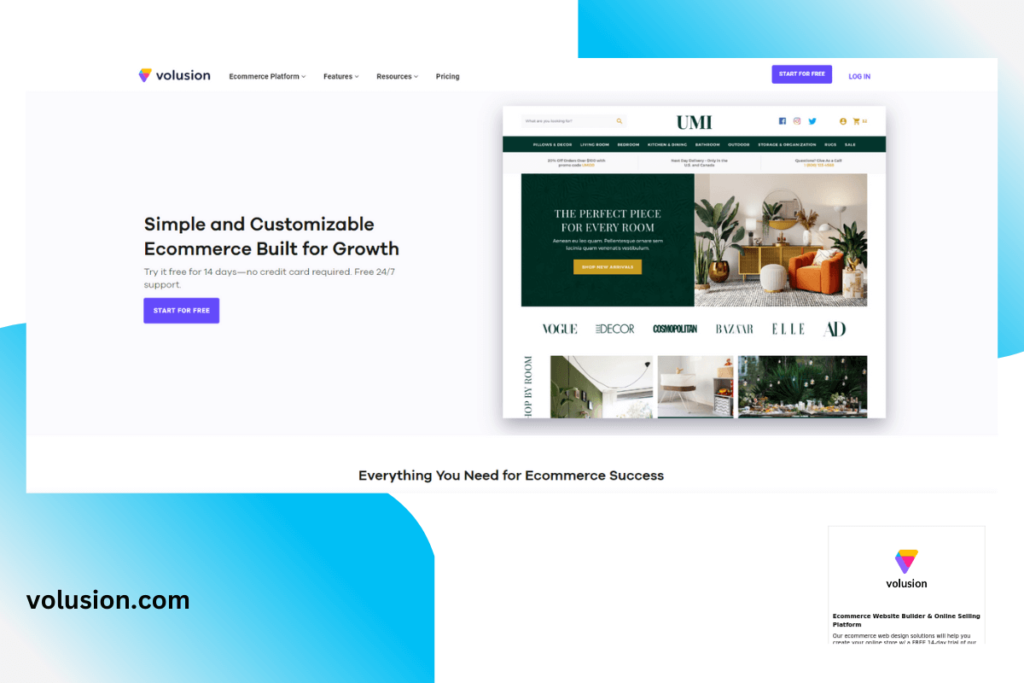
Perhaps your apparel brand offers customers access to a fashion blog, or other web-based conversation. Or perhaps you’re making the move from fashion blogger to fashion maker, and you need a simple way to integrate sales across multiple platforms. Volusion, like many platforms featured here, offers customers an easy-to-use e-commerce platform. Unlike many, Volusion easily integrates into WordPress, allowing for detailed content management. Volusion also allows customers to integrate storefronts through Amazon and Ebay and provides access to a host of payment processors, including credit card processors and external gateways.
In addition to these features, Volusion offers sellers handy inventory management tools and a handful of built-in SEO and marketing tools, including Google Analytics. Integrated drop-shipping is included in the basic accounts; as your business grows, Volusion offers a tiered series of plans that unlock deeper features that may be needed.
9. PrestaShop
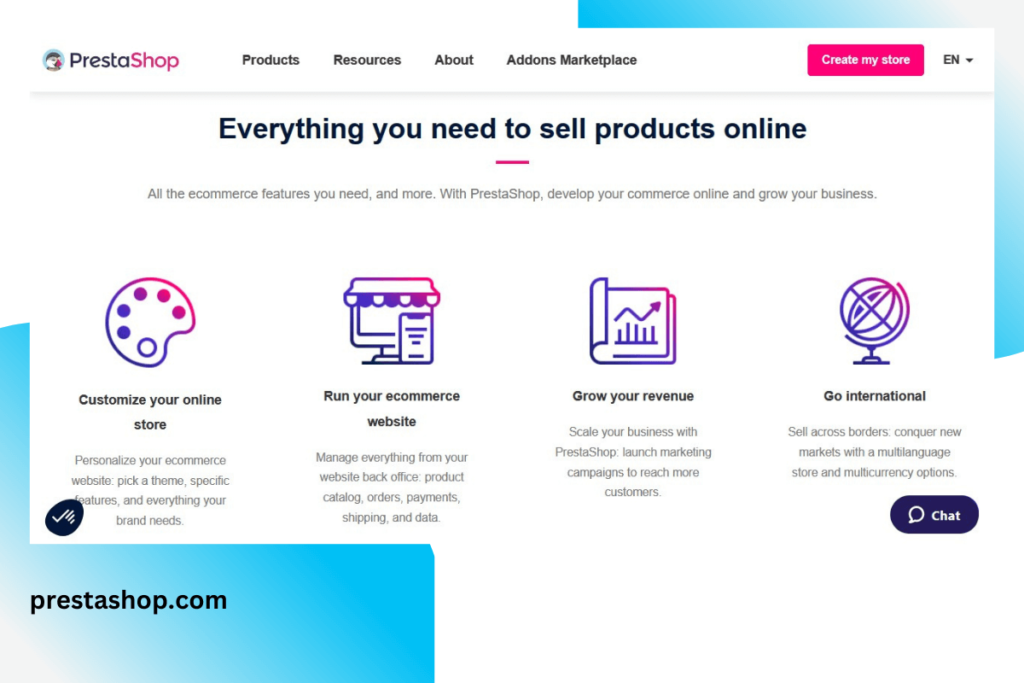
PrestaShop is an open-source e-commerce platform offering users a truly global reach – sellers can easily have their platform configured in a variety of languages and currencies, allowing sales across borders. 300,000 merchants have configured custom storefronts through PrestaShop, making it a very popular platform for sellers. There are many custom themes available that can be customized to give your storefront the appeal you seek.
Because it is open-source, PrestaShop’s code can be tweaked and optimized by sellers with highly specific use-cases. Like many open-source softwares, PrestaShop has a well-developed community of developers, users, and administrators who work together for the betterment of the platform.
PrestaShop can be set up through a separate host, or it can be hosted with the PrestaShop Ready version. The basic platform is expandable through modules that offer SEO, data analytics, and other features, but these may be paywalled.
10. Wix
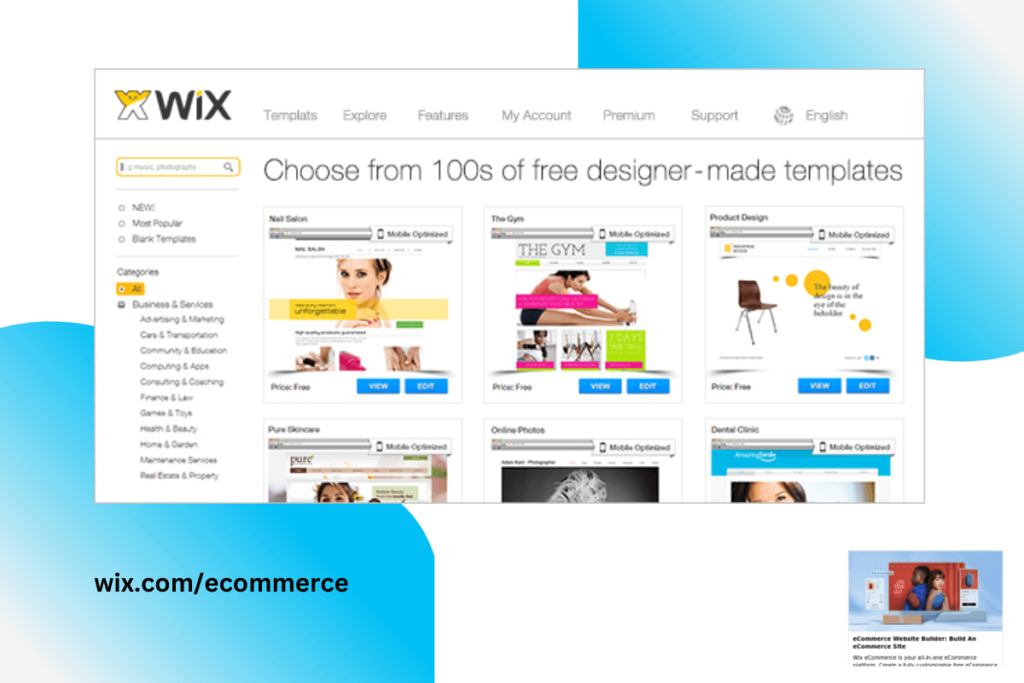
Wix is a well-known platform for a variety of internet-based businesses. Designed for users who are not highly technical and building on a reputation for ease of use and customizability, Wix has a drag-and-drop editor that eliminates the need for technical or coding skills. As consumers increasingly shop and work on mobile devices and pivot away from traditional desktop PCs, Wix has designed their website templates to be optimized for mobile users, ensuring that shoppers will see your storefront as beautifully on their smartphone as they do on their laptop.
For entrepreneurs needing help developing their brand, Wix offers a number of useful tools. The Wix Logo Maker and Business Name Generator can help aspiring apparel sellers develop a coherent brand image. Wix will help you drive sales through channels such as Amazon, eBay, and Instagram. They also support drop-ship operations and offer the ability to build customized, themed subscription boxes for your customers.
Wix offers you built-in hosting, custom domains, and basic SEO tools that can get your brand’s platform started quickly. Graphic features such as lightboxes and video support help you attract buyers to specific products. The Wix dashboard is a comprehensive system that allows you to manage multiple aspects of your business in one place, and is accessible through a mobile application.
Which eCommerce Platform is Best?
It’s easier than ever before to build your business through e-commerce. The ten e-commerce platforms we’ve reviewed here all offer unique blends of customer service, customizability, and business features. The question of which platform is the best overall is challenging to answer because the needs of each apparel business are unique and highly dependent on the circumstances of the business. That said, the options laid out here should be appealing to a wide variety of apparel businesses. Bigger businesses with traditional storefronts and existing e-commerce functions may find platforms such as Magento more useful; entrepreneurs, start-ups, and designers may find a platform such as Wix or Shift4Shop more to their liking. These platforms are all purpose-built to help you grow your business, reach your customers, and thrive in the e-commerce environment. And for apparel designers and sellers, these platforms offer features that will help you focus on your passion without getting too caught up in the technical details.
